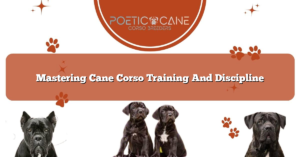Discover the dynamic and diverse training methods that will transform your relationship with your Cane Corso.
From basic obedience to advanced mental stimulation, this article explores effective techniques for unleashing your dog’s potential.
With positive reinforcement and socialization exercises, you’ll create a well-rounded and well-behaved companion.
Leash training and crate training ensure a harmonious home, while behavior modification addresses specific issues.
Get ready to embark on a journey of agility and physical exercise, as you continue to educate and maintain your Cane Corso’s exemplary behavior.
Key Takeaways
- Use leash and collar for control and proper behavior
- Consistency and positive reinforcement are key in training
- Socialization and exposure to different people, animals, and environments is important
- Crate training and housebreaking should be done gradually with positive reinforcement
Basic Obedience Training
To start basic obedience training for your Cane Corso, begin with the use of a leash and collar. These training tools are essential for establishing control and teaching your Cane Corso proper behavior. When using the leash and collar, make sure to keep the leash loose and provide gentle corrections when needed.
Start with simple commands like ‘sit’ and ‘stay’ and reward your Cane Corso with treats and praise for following the commands correctly. Consistency is key in training your Cane Corso, so make sure to practice these commands regularly.
It’s important to remember that positive reinforcement works best with this breed, so be patient and use plenty of encouragement and rewards. With the right training methods, your Cane Corso will quickly learn and become a well-behaved companion.
Positive Reinforcement Techniques
Use treats as a concrete reward to reinforce desired behaviors when training your Cane Corso.
Positive reinforcement techniques are a highly effective way to train your Cane Corso and build a strong bond with them.
When your Cane Corso exhibits the desired behavior, such as sitting or staying, immediately give them a treat as a reward. This positive association will motivate them to repeat the behavior in the future.
Remember to use small, tasty treats that your Cane Corso finds irresistible. Be consistent and reward them every time they perform the desired action correctly.
It’s important to use positive reinforcement techniques consistently to ensure that your Cane Corso understands what’s expected of them and feels encouraged to continue learning and improving.
Socialization and Exposure Exercises
Continue building a strong bond with your Cane Corso by engaging in socialization and exposure exercises that introduce them to a variety of people, animals, and environments.
This will help your Cane Corso develop good manners and become well-rounded. Start by taking your dog on walks in different neighborhoods or parks, allowing them to encounter different sights, sounds, and smells.
Encourage positive interactions with other dogs by organizing play dates or enrolling them in obedience classes. Expose your Cane Corso to different situations, such as busy streets, crowded places, and various weather conditions, to help them become comfortable in different environments.
Introduce them to different types of people, including children, adults, and individuals with disabilities, to ensure they’re friendly and accepting of everyone they meet. Remember, early socialization is crucial for a well-behaved and confident Cane Corso.
Leash Training and Loose Leash Walking
Begin leash training your Cane Corso by establishing clear expectations for loose leash walking. This is an important skill for your dog to learn, as it will make walks more enjoyable for both of you.
To help you with the training process, here are some tips:
- Use positive reinforcement: Reward your dog with treats or praise when they walk calmly on a loose leash.
- Start in a quiet, distraction-free environment: Begin training in a place where there are minimal distractions to help your dog focus on the task at hand.
- Practice consistency: Be consistent with your commands and expectations, so your dog understands what’s expected of them.
- Gradually increase difficulty: Once your dog has mastered loose leash walking in a controlled environment, gradually introduce more distractions to challenge their skills.
Crate Training and Housebreaking
To effectively crate train and housebreak your Cane Corso, establish a consistent routine that reinforces positive behaviors.
Begin by introducing the crate as a safe and comfortable space for your dog. Make sure it’s the right size for them to stand, lie down, and turn around in comfortably. Use positive reinforcement, such as treats and praise, to encourage your dog to enter the crate willingly.
Gradually increase the amount of time they spend inside, starting with short intervals and gradually lengthening them. Remember to never use the crate as a form of punishment.
When it comes to housebreaking, take your dog outside frequently, especially after meals and naps. Use a designated area for them to eliminate and reward them when they do so. Clean up accidents with an enzymatic cleaner to remove any lingering scent.
Consistency, patience, and positive reinforcement will help your Cane Corso become crate trained and housebroken.
Command Training for Essential Cues
Start by incorporating command training into your daily interactions with your Cane Corso. This will help establish a clear line of communication and ensure that your dog understands and responds to essential cues. Consistency and positive reinforcement are key when training your Cane Corso, so be patient and rewarding during the process.
Here are four key commands to focus on during training:
- Sit: Teach your Cane Corso to sit on command, which is a fundamental cue for control and obedience.
- Stay: Train your dog to stay in one place until given permission to move, promoting discipline and safety.
- Come: Teach your Cane Corso to come when called, reinforcing their recall skills and allowing for off-leash freedom.
- Leave it: Train your dog to ignore and leave any object or food you instruct them to, preventing potential dangers or unwanted behavior.
Advanced Training for Mental Stimulation
Continue building on your Cane Corso’s training by incorporating advanced methods that provide mental stimulation. This will help to keep your dog engaged and prevent boredom. One effective way to provide mental stimulation is through puzzle toys.
These toys require your dog to use problem-solving skills to access treats or toys hidden inside. Another method is the use of scent work. You can hide treats or toys around the house or yard and encourage your Cane Corso to use their nose to find them. Lastly, consider enrolling your dog in advanced obedience or agility classes.
These activities not only challenge your dog physically but also mentally, as they have to learn and follow complex commands or navigate through obstacle courses. Incorporating these advanced training methods will keep your Cane Corso mentally sharp and satisfied.
| Advanced Training Methods | Description | Benefits |
|---|---|---|
| Puzzle Toys | Toys that require problem-solving skills to access treats or toys hidden inside. | Provides mental stimulation and prevents boredom. |
| Scent Work | Hiding treats or toys for your dog to find using their sense of smell. | Engages your dog’s natural hunting instincts and enhances their olfactory abilities. |
| Advanced Obedience/Agility Classes | Enrolling your dog in advanced obedience or agility classes to challenge them mentally and physically. | Allows your dog to learn and follow complex commands and navigate obstacle courses, keeping them mentally sharp. |
Behavior Modification for Specific Issues
- Identify the specific behavior issues that need modification in your Cane Corso. Start by observing your dog’s behavior and pinpointing the areas that need improvement. It could be excessive barking, aggression towards other dogs, separation anxiety, or destructive chewing.
To effectively modify these behaviors, consider the following techniques:
- Positive reinforcement: Reward your dog with treats, praise, or playtime when they exhibit the desired behavior.
- Counter-conditioning: Gradually expose your dog to the situations that trigger the unwanted behavior, while providing positive experiences to change their emotional response.
- Desensitization: Gradually increase your dog’s tolerance to the stimuli that provoke the unwanted behavior, helping them become more comfortable over time.
- Management strategies: Implement measures to prevent the occurrence of the unwanted behavior, such as using baby gates, crates, or muzzle training.
Agility and Physical Exercise Training
To improve your Cane Corso’s overall behavior and physical fitness, incorporate agility and physical exercise training into their routine. Agility training not only helps to keep your dog physically fit, but also enhances their mental acuity and coordination.
It involves navigating through obstacles such as tunnels, weave poles, and jumps, which promotes flexibility and quick thinking. Physical exercise training, on the other hand, focuses on activities like running, swimming, and playing fetch to build endurance and strengthen muscles.
By incorporating both agility and physical exercise training into your Cane Corso’s routine, you can help them burn off excess energy, prevent boredom, and maintain a healthy weight. Check out the table below for some examples of agility exercises and physical exercises that you can incorporate into your dog’s training regimen.
| Agility Exercises | Physical Exercises |
|---|---|
| Tunnel run | Running/jogging |
| Weave poles | Swimming |
| Jumps | Fetch |
Remember to start slow and gradually increase the difficulty level to avoid any injuries or strain.
Continuing Education and Maintenance Training
To maintain your Cane Corso’s behavior and skills, continue their education and provide ongoing maintenance training. This will help reinforce their training and ensure that they remain well-behaved and obedient.
Here are some key points to consider for continuing education and maintenance training:
- Consistency: Stick to a regular training schedule to reinforce learned behaviors and prevent regression.
- Positive reinforcement: Continue using rewards and praise to motivate and encourage your Cane Corso during training sessions.
- New challenges: Introduce new exercises or tasks to keep your dog mentally stimulated and prevent boredom.
- Socialization: Continue exposing your Cane Corso to different environments, people, and animals to ensure they remain well-socialized.
Frequently Asked Questions
What Are Some Common Health Issues That Cane Corsos May Face?
Some common health issues that Cane Corsos may face include hip dysplasia, gastric dilatation volvulus (GDV), and heart disease. Regular vet check-ups, a balanced diet, and exercise can help prevent and manage these issues.
How Long Does It Typically Take to Housebreak a Cane Corso?
It typically takes about 4-6 months to housebreak a Cane Corso. Consistency, positive reinforcement, and patience are key. Remember to establish a routine, take them outside frequently, and reward them for going potty outside.
Are There Any Specific Dietary Requirements for Cane Corsos During Training?
During training, it is important to consider the dietary requirements of your Cane Corso. While there are no specific requirements, a balanced diet with high-quality protein and appropriate portion sizes can optimize their performance.
Can Cane Corsos Be Trained to Be Good With Children and Other Pets?
Yes, cane corsos can be trained to be good with children and other pets. Consistent socialization, positive reinforcement, and supervised interactions are key. Remember, patience and time are necessary for building trust and creating a harmonious environment.
Do Cane Corsos Require Any Special Grooming or Maintenance?
Cane Corsos do require special grooming and maintenance. Regular brushing and occasional baths are necessary to keep their coat healthy. Additionally, their ears should be checked and cleaned to prevent infections.

Sydney Kimberly is a passionate Cane Corso lover and dedicated breeder. With years of experience, she’s committed to raising these majestic dogs, ensuring they thrive in loving homes. Sydney’s expertise shines in her dedication to preserving the breed’s excellence, temperament, and health. Discover more about her Cane Corso journey and insights.




